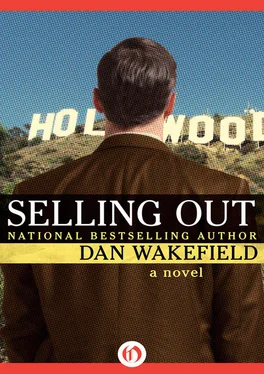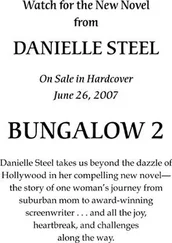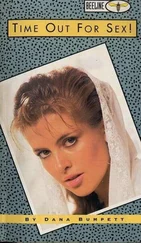“Yes?”
“ What if —Jack and Laurie are, like many newly married couples, broke.”
“Yes? They would be. Sure.”
“And what if—to solve some of their financial problems, they decided to move in with their in-laws.”
“Which ones? His or hers?”
“Which would be more interesting? Create more problems?”
“Hers—because her father’s a professor. He and Jack are kind of in competition.”
“Perfect.”
“Yeah—I mean, all kinds of things would happen. Funny. Sad. Real.”
“You got it.”
“Hey—this is not bad.”
There was a buzz, and Archer grunted into the phone and said, “All right, if it’s urgent—I’ll get back to him in two minutes.”
Archer turned and stared at Perry, seeming to look straight into him.
“This is your show,” he said. “I have total confidence.”
Perry stood up, feeling dizzy with panic.
“Listen, thanks, but—well, isn’t there something more I should know? Some basic rules or something? About writing for television?”
Archer walked slowly up to Perry, coming so close their noses were almost touching. He uttered one word, like a command.
“ Don’t ,” he said.
“What?” Perry asked, confused. “Don’t what?”
“Don’t try to ‘write for television.’ Write the best damn thing you can. Don’t think about ratings or networks or any other bullshit. Just write the finest script that’s in you.”
Perry looked directly into Archer’s eyes, trying to detect any sign of falseness, but the young executive gazed relentlessly back at him, back into him , it felt like.
“I hope you mean that,” Perry said.
“Try me.”
“I will.”
Archer stepped back and gave Perry a quick squeeze on the shoulder.
“Go for it,” he said, then turned away.
Perry walked out of the room, a slight smile playing on his lips as he savored the situation. All right, he’d been given free rein and he was going to take it. He was going to give Archer Mellis the classiest, most intelligent script that was in him. Then he’d find out just how much this character actually meant what he said about raising the quality of prime-time television.
Everything was new.
It was really the same old stuff, of course, the tools and totems Perry Moss had used on thousands of days over years and years. There was the beat-up old manual Royal portable typewriter with the beige body and green keys (including the “k” that always stuck), the solid ream-size package of plain white typing paper, the yellow pencils arrayed with sharpened points sticking up from the chipped souvenir Red Sox mug, the tiny steel toy locomotive whose smokestack was actually a pencil sharpener, the plug-in electric percolator brewing the black coffee that was strong enough to “corrode nails,” according to Jane, and, of most recent vintage, the color photo of Perry and Jane in the autumn flare of the mountains of Vermont that was taken by Al Cohen and given to Perry for a birthday gift in a plastic frame-stand. Perry had only planned to bring out the faithful Royal portable for this month-long stint but Jane had also prudently packed what she called “the essential toys” to insure his psychic ease and comfort.
The rituals were the same, also: the lighting of the pipe, sharpening of pencils, folding paper into halves to make notes and scribbles on, pacing back and forth across the room, moving in closer, then taking a deep breath and planting himself in the chair, down to business.
The words were the same, too. They were the ones he had always used, the ones that had served him so well. He had not had to learn some new vocabulary. Archer had even brushed aside his concern over mastering technical terms to put in the kind of stuff he had seen in some scripts like “pan to” and “dolly” and “angle on.” Directors liked to put those things in themselves, Archer explained, and writers didn’t really have to worry about it.
Just write.
Perry wrote, using the old familiar words, but —and this was an exciting difference that made the whole process he was undertaking seem more exotic—he was putting the words on paper in a new and different way.
They looked like this:
INTERIOR—JACK AND LAURIE’S BEDROOM—DAY
LAURIE stirs, wakes, and yawns. She looks around the room, looks next to her in the bed, sees JACK, her husband. She smiles, and rubs her hand soothingly along his back.
LAURIE
Jack?
JACK groans, and moves away from LAURIE.
JACK
Huh?
Perry looked at the page and felt an odd tingle of excitement. These were his first words—at least the first words he had written that would actually be spoken, by real actors, in front of a camera, for an audience of millions. Suddenly he started to laugh, at himself, at the foolishness of pride in getting a couple of gruntlike sounds on paper, yet he sensed that something important had occurred.
He was doing it. He was writing a script. Stoking his pipe, he returned to the work with a feeling of heightened energy and elation.
Several hours later he stood up and stretched and walked around the room, humming to himself. He had written three pages. Of a script . He was doing something he had never done before, something completely new.
At age forty-three.
Who said you couldn’t teach an old dog new tricks?
He not only felt he was doing something new, but that he was new. Or re newed, anyway. He felt refreshed, revitalized, by a feeling of command, of creation. Maybe that’s why the writer’s credit for a TV series didn’t just say “written by” but “created by.”
Created .
Yes.
This was different from writing a story. Maybe it was the knowledge that live actors would be performing it that made the whole thing seem more palpable, real. He had the sense that instead of just writing, he was creating a world and putting people in it, making them move where he wanted and say what he wished. He could see Jack and Laurie in their bed, waking and moving; he could hear the tone of their voices.
He cared for them, of course, they were his own creatures, from the time when he imagined and named them back in the creation of the original short story, and now, in this new incarnation, he cared for them even more, felt even more protective of them. It was his duty to maintain their integrity, and of course in so doing he would maintain his own.
Smiling, he went to find Jane to tell her how happy he was she had made him stay.
Perry had wanted to see his old friends the Vardemans ever since he first arrived on the Coast, but he hadn’t yet been able to reach them. All he got was their answering service. Of course he understood they were snowed under now, socially as well as professionally, what with their amazing success in the movie industry as, respectively, top directors’ agent and producer.
Still, his friendship went back to grad-school days, when he and Vaughan had been restless, rebellious students at Harvard, shared a grungy one-bedroom apartment, and dropped out together after the first year—Perry to devote himself to dishwashing and short-story writing, Vaughan to marry the brilliant Radcliffe student editor Pru Pinchel and move with her to New York when she landed her first job as a literary agent. He pursued his own literary dreams on her salary, writing book reviews that were published and novels that were not.
When they shifted to the Coast a decade ago to courageously crash the movie business, Perry enjoyed keeping track of their rise. Pru took on an unknown director and got him his first film job, and soon convinced Vaughan through her own experience that writing gave the lowest prestige and profit in Hollywood. She turned him to producing projects she packaged with her growing list of hot young directors. Perry kept in touch through late-night phone calls and postcards and funny letters, even the occasional drink or dinner when the Vardemans came back East.
Читать дальше












